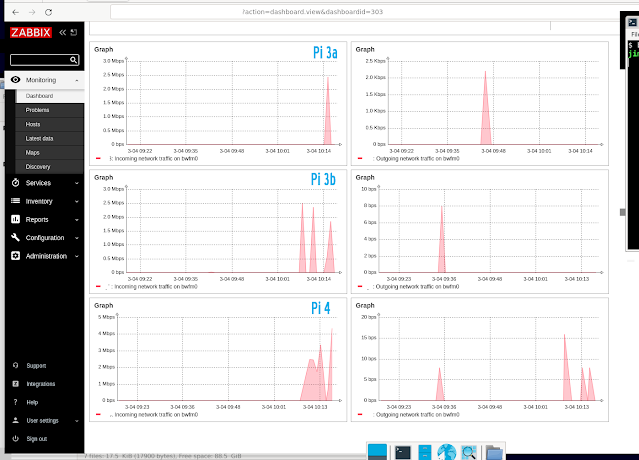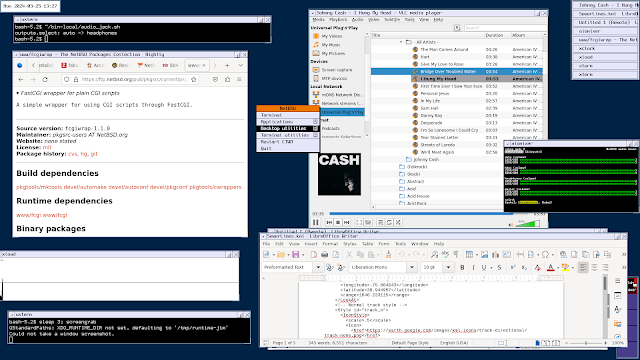Mar 21 22:05:32 nb4 /netbsd: [ 1.3996878] bwfm0 at sdmmc0 function 1
Mar 21 22:05:32 nb4 /netbsd: [ 3.6135988] bwfm0: Firmware file default: brcmfmac43455-sdio.bin
Mar 21 22:05:32 nb4 /netbsd: [ 3.6135988] bwfm0: Firmware file model-spec: brcmfmac43455-sdio.Raspberry Pi 4 Model B.bin
Mar 21 22:05:32 nb4 /netbsd: [ 3.6197181] bwfm0: Found Firmware file: brcmfmac43455-sdio.bin
Mar 21 22:05:32 nb4 /netbsd: [ 3.6197181] bwfm0: NVRAM file default: brcmfmac43455-sdio.txt
Mar 21 22:05:32 nb4 /netbsd: [ 3.6197181] bwfm0: NVRAM file model-spec: brcmfmac43455-sdio.Raspberry Pi 4 Model B.txt
Mar 21 22:05:32 nb4 /netbsd: [ 3.6197181] bwfm0: autoconfiguration error: NVRAM file not available
Mar 21 22:05:32 nb4 /netbsd: [ 3.6197181] bwfm0: CLM file default: brcmfmac43455-sdio.clm_blob
Mar 21 22:05:32 nb4 /netbsd: [ 3.6197181] bwfm0: CLM file model-spec: brcmfmac43455-sdio.Raspberry Pi 4 Model B.clm_blob
When it works:
genet0: flags=0x8843<UP,BROADCAST,RUNNING,SIMPLEX,MULTICAST> mtu 1500
ec_capabilities=0x1<VLAN_MTU>
ec_enabled=0
address: []
media: Ethernet autoselect (1000baseT full-duplex)
status: active
inet6 [] flags 0 scopeid 0x1
inet 192.168.1.2/24 broadcast 192.168.1.255 flags 0
lo0: flags=0x8049<UP,LOOPBACK,RUNNING,MULTICAST> mtu 33624
status: active
inet6 ::1/128 flags 0x20<NODAD>
inet6 fe80::1%lo0/64 flags 0 scopeid 0x2
inet 127.0.0.1/8 flags 0
bwfm0: flags=0x8843<UP,BROADCAST,RUNNING,SIMPLEX,MULTICAST> mtu 1500
ssid [] nwkey *****
powersave off
bssid [] chan 11
address: []
media: IEEE802.11 autoselect (HT mode 11ng)
status: active
inet6 []%bwfm0/64 flags 0 scopeid 0x3
inet 192.168.1.1/24 broadcast 192.168.1.255 flags 0
Firmware/devices seems fresh:
$ ls -l /boot/dtb/broadcom/
-r-xr-xr-x 1 root wheel 37735 Mar 12 10:19 bcm2711-rpi-4-b.dtb
-r-xr-xr-x 1 root wheel 37679 Mar 12 10:19 bcm2711-rpi-400.dtb
-r-xr-xr-x 1 root wheel 20741 Mar 12 10:19 bcm2837-rpi-3-a-plus.dtb
-r-xr-xr-x 1 root wheel 21610 Mar 12 10:19 bcm2837-rpi-3-b-plus.dtb
-r-xr-xr-x 1 root wheel 21142 Mar 12 10:19 bcm2837-rpi-3-b.dtb
-r-xr-xr-x 1 root wheel 20465 Mar 12 10:19 bcm2837-rpi-cm3-io3.dtb
A recent mail message contains the sym-fix:
"
In this image, a symbolic link added
/libdata/firmware/if_bwfm:
ln -s brcmfmac43455-sdio.raspberrypi,4-model-b.txt "brcmfmac43455-sdio.Raspberry Pi 4 Model B.txt"
to avoid
bwfm0: autoconfiguration error: NVRAM file not available
"
But I get a wrong address range assigned, so not yet solved.
bwfm0: flags=0x8843<UP,BROADCAST,RUNNING,SIMPLEX,MULTICAST> mtu 1500
ssid [] nwkey *****
powersave off
bssid [] chan 11
address: []
media: IEEE802.11 autoselect (HT mode 11ng)
status: active
inet6 []%bwfm0/64 flags 0 scopeid 0x3
inet 169.254.x.y/16 broadcast 169.254.255.255 flags 0
Any tips welcome...
Audio/Video
Besides the ubiquitous VLC app (GUI and CLI), I've used mpg123 and mp3blaster on NetBSD systems as command line audio/video players. With a miniDLNA UPnP set-up and steaming internet radio stations I have good tunes at will. In the good old days. a SoundBlaster interface card was the way to go. Theses days, audio circuity is either built-in the system, or ready as easily as popping in a USB dongle.
Prior versions of NetBSD on Raspberry Pi systems had challenges with the wired headphone circuit and with audio through HDMI (in some cases not the system fault but a lack of speakers in a monitor. The audio streams would play okay for a while but within a day or so various buffer/cache issues came up, causing no sound, or worse, choppy static.
Mar 21 21:59:01 nb4 /netbsd: [ 547447.7922531] audio0(vcaudio0): device timeout
Mar 21 22:07:30 nb4 /netbsd: [ 162.7814073] audio0(vcaudio0): setting play.port=0 failed: errno=22
Controls:
$ /usr/bin/mixerctl -w outputs.select=headphones
outputs.select: headphones -> headphones
$ /usr/bin/mixerctl -v -a
outputs.master=255,255 volume
inputs.dac=255,255 volume
outputs.auto=255,255 volume delta=13
outputs.headphones=255,255 volume delta=13
outputs.hdmi=255,255 volume delta=13
outputs.select=headphones [ auto headphones hdmi ]
I'm getting about a week of playing, at intervals, before contention creeps in.



No comments:
Post a Comment